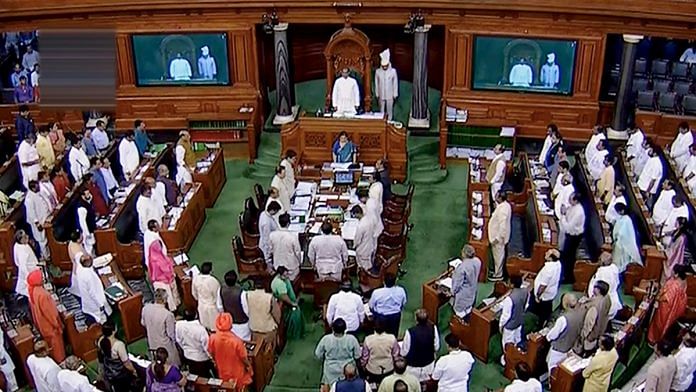New Delhi: The Lok Sabha Monday passed the Right to Information (Amendment) Bill, 2019, leading to questions being raised about the Narendra Modi government’s commitment to transparency.
The bill was passed amid strong criticism from the opposition benches. It is expected to come up in the Rajya Sabha this week.
The amendments, which seek to give the central government a greater say in the tenure and compensation of Information Commissioners (ICs), were passed after a division of votes, with 178 members supporting it and 79 voting against it.
Opposition united against the bill
In a rare show of unity, opposition parties, including the Congress, Trinamool Congress, Biju Janata Dal and the DMK, joined hands to oppose the amendments.
Congress’ Shashi Tharoor said the amendments have been deliberately brought in to change the RTI framework, and compromise the independence of IC.
BJD’s Bhartruhari Mahtab said the amendments were an “assault on the idea of federalism”.
DMK’s A. Raja called it a dark day for democracy.
What are the amendments?
The bill, introduced in the Lok Sabha Friday, proposes two major changes to the 2005 RTI Act brought in by the Congress-led UPA government.
One, the bill seeks to alter the current tenure of the Central Information Commissioner (CIC) and ICs — five years or the attainment of 65 years of age. The amendment does not specify tenure, and leaves the final call to be taken by the central government on a case-to-case basis. The government may decide to specify a tenure when it frames the rules, if and when the bill becomes an act.
Moreover, departing from the original Act’s provision that the CIC and ICs will be paid a salary equivalent to the Chief Election Commissioner and Election Commissioners, the bill says this will also be left to the discretion of the central government.
The amendment bill also removes the provision that when appointed, if CIC and ICs are receiving pension or any other retirement benefits for previous government service, their salaries will be reduced by an amount equal to the pension.
Also read: 5 reasons why BJP govt’s transparency claims must be questioned
Government’s claim
The government claims the equivalence drawn between the ECI and CIC is flawed, and that through these amendments, it is trying to streamline and strengthen the Act, while also bringing in greater transparency. Minister of State in the PMO Jitendra Singh said as much while introducing the bill.
In its statement of objects and reasons in the bill, the Modi government says of the difference between the ECI and the CIC: “The Election Commission is a constitutional body established by clause (1) of article 324 of the Constitution and is responsible for the superintendence, direction and control of the preparation of the electoral rolls for, and the conduct of, all elections to Parliament and to the Legislature of every State and of elections to the offices of President and Vice-President held under the Constitution.
“On the other hand, the Central Information Commission and State Information Commissions are statutory bodies established under the provisions of the Right to Information Act, 2005. Therefore, the mandate of Election Commission of India and Central and State Information Commissions are different. Hence, their status and service conditions need to be rationalised accordingly.”
Activists also up in arms
Former CIC Wajahat Habibullah told ThePrint that the amendments cleared by the Lok Sabha could severely cripple the neutrality of information commissioners “because the government will decide everything — from the tenure of the ICs to their salaries”.
“It will mean that the ICs will be beholden to the government. They will behave like the employees of the government. If they so wish, they can decide to withhold information that can embarrass the government,” he said.
Activist Nikhil Dey, who was involved in bringing in the RTI legislation from the beginning, said the government’s claim that it is trying to streamline the Act has “no leg to stand on”.
“It is clear it (the bill) wants to bring an independent institution like the Central Information Commission under the absolute control of the central government,” Dey said.
“The CIC and ICs deal with huge vested interests, especially in the senior bureaucracy. It is important for them to be independent. The Information Commission is a very important leg of the entire structure and if you weaken this leg, the whole structure gets weakened.
“On issues like NPAs, demonetisation, RBI etc, the information commission got the government to reveal significant information — something it can do only if it has both authority and independence.”
The National Campaign for People’s Right to Information (NCPRI) — an independent RTI watchdog — has said it will organise nationwide protests if these amendments are made.
Also read: Two Supreme Court benches, two different takes on freedom of speech and expression



